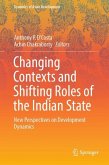This book bridges a fundamental aspect of human behavior, empathy, with a critical area of social science, economics. It introduces readers to the concept of empathy and situates it within broad economic thought, from strategic decision-making in game theory to its role in management, health, education, welfare, and migration.
Through interdisciplinary research spanning development economics, welfare economics, behavioral economics, business management, psychology, political science, and more, the book offers an exploration of empathy s impact on economic behavior. It examines historical and contemporary economic models, highlighting both the potential benefits and limitations of empathy-driven approaches.
Rather than presenting empathy as a rigid normative concept, the book encourages critical discussions, fostering new research and ideations on empathic economic models. Beneficial for economists, policymakers, and scholars, it challenges traditional economic frameworks and advocates for integrating empathy into economic planning to enhance human well-being.
Through interdisciplinary research spanning development economics, welfare economics, behavioral economics, business management, psychology, political science, and more, the book offers an exploration of empathy s impact on economic behavior. It examines historical and contemporary economic models, highlighting both the potential benefits and limitations of empathy-driven approaches.
Rather than presenting empathy as a rigid normative concept, the book encourages critical discussions, fostering new research and ideations on empathic economic models. Beneficial for economists, policymakers, and scholars, it challenges traditional economic frameworks and advocates for integrating empathy into economic planning to enhance human well-being.








